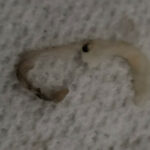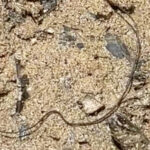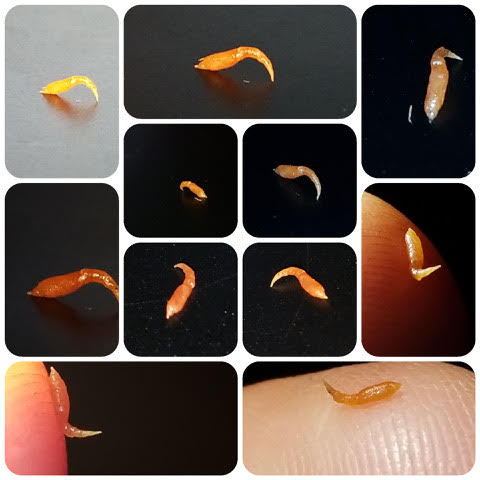
“Can tapeworms live on walls?” is all Robin asks in her submission regarding the yellow object in the photo. To begin with, we have to point out that we are not qualified or legally able to identify tapeworms, because they are parasites. Only a medical professional is legally able to identify parasites, or any other organism that directly affect the health of people or pets, because that identification is tantamount to a diagnosis: it dictates what types of treatments and/or medications a human/animal might need as a result of finding that parasite. Now, we realize that Robin did not ask us to identify a tapeworm: she only asks if they can live on walls. But the photo is somewhat confusing, as it does not seem to show a tapeworm, or any organism for that matter, so we do not know its purpose.
In any case, the short answer to Robin’s question is ‘no’. The long answer is that, since tapeworms are parasites, they need to feed off the nutrition of a host body in order to survive. In the case of the beef tapeworm (one of the most common species), cattle and humans contract them by accidentally ingesting their eggs. Once the eggs are inside the body, they hatch, producing larvae. Those larvae will move in the blood of the host until it finds a muscle it wants to attach to. Once it does, it creates a cyst around itself in order to begin maturing into the adult worm, much like a caterpillar creates a chrysalis around itself to transform into a butterfly or moth. Once the tapeworm has matured, it travels into the intestines of the animal, where it feeds on any of the food that the animal eats. It consequently grows inside the intestines.
Without feeding on the nutrients in the intestines, the tapeworm would not grow. For that reason, a tapeworm would not be able to survive outside a host, and would thereby not survive on a wall. We are sure they are sticky enough that they would stick to a wall, but no, they cannot live on walls, so Robin does not have to worry about that. If she is worried about tapeworms in general, and thinks she might be experiencing something of that sort, we recommend consulting a medical parasitologist: a type of physician who specializes in identifying and treating parasitic infections, like those caused by tapeworms. To find a medical parasitologist or other health care provider who can actually help, Robin can do one or more of the following:
– Visit our parasite care resources page here: https://www.allaboutworms.com/get-medical-attention-and-tests-for-parasites
– Search for a medical parasitologist in her area using this directory of medical parasitology consultants: https://www.astmh.org/for-astmh-members/clinical-consultants-directory.
– Search for a local parasitologist by doing a Google search for “medical parasitologist (name of the closest big city)” or “tropical medicine specialist (name of the closest big city)”.
To conclude, tapeworms cannot live on walls, because they are parasites that can only mature inside the body of a host. We hope this clarifies things for Robin, and we wish her the very best!
All About Worms is always free, always reader-supported. Your tips via CashApp, Venmo, or Paypal are appreciated! Receipts will come from ISIPP Publishing.
You might also find these guys interesting!















